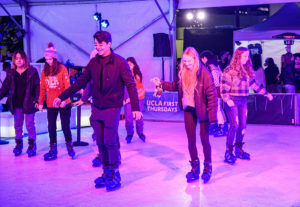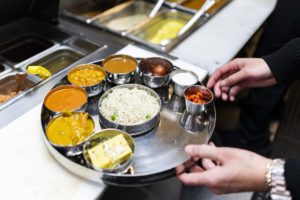This weekly podcast series brings you the biggest news from around the world, across the country and on campus every Friday, and we tell you how these stories affect UCLA students. Podcasts editor Jack Garland and Podcasts contributors Zoë Bordes and Reese Dahlgren discuss the Israel-Hamas war, the alleged plot by the Indian government to assassinate a U.S. citizen, and more. Later in the episode, they are joined by assistant News editor Dylan Winward to discuss the opening of 99 Ranch Market in Westwood.
Jack Garland: Today is Friday, December 1. And you are listening to This Week by Daily Bruin Podcasts.
This is the second episode of our new weekly podcast series. Every Friday, we’ll recap the biggest news of the week from around the world, across the country and right here on campus, and then we’ll explain to you how these stories affect UCLA students. I’m Jack Garland, and I’m the Podcasts editor.
Zoë Bordes: I’m Zoë Bordes, and I’m a Podcasts contributor and the international correspondent today.
Reese Dahlgren: And I’m Reese Dahlgren, a podcast contributor and the national correspondent.
JG: And later in the episode, we’ll be joined by a Daily Bruin News editor. Before we get started, do you all have any highlights from this past week?
ZB: I had a really good strawberry matcha from a small business, so that was really good.
RD: I played a lot of tennis this week, so that was pretty fun.
JG: Alright, so now let’s get into the news. The biggest international story from this week is still the Israel-Hamas war. So are there any updates with that?
ZB: Yeah, so there’s been some positive news about the situation. The two sides reached a temporary truce that was approved on November 22, and it was initially a four-day ceasefire hostage exchange deal effective as of Friday, November 24. In this deal, it was agreed that Hamas would free 50 women and children who were taken hostage in return for 150 Palestinian women and teenagers in Israeli detention. Also, as part of the agreement, more emergency aid was allowed to enter Gaza. And as a result, this truce has been considered a humanitarian pause. The chief broker of this agreement was Qatar, alongside Egypt and the U.S.
JG: So that original ceasefire deal has expired. What’s happened since then?
ZB: So the deal has been extended multiple times, which has allowed more hostages to be released. The truce is set to expire today, but Egypt and Qatar are working to extend it for another two days. And on Thursday, negotiations went down to the wire, and the pause was extended at the last minute. So it’s possible that a similar scenario will happen again. So far, 104 women and children hostages have been freed by Hamas, and 143 remain. Israel has released 240 women and children.
JG: And what is the U.S. doing now?
ZB: U.S. Secretary of State Blinken has met with Israeli leaders and the president of the Palestinian Authority and has said that this policy has allowed more humanitarian aid to enter Gaza. In addition, while he says Washington supports Israel’s right to self defense, he has told the Israeli Prime Minister Benjamin Netanyahu that Israel needs to make more efforts to comply with international law and protect civilians in Gaza.
JG: And so how is all of this relevant to Bruins?
ZB: The Israel-Hamas war is obviously very personal to a lot of students. There’s been a lot of protests and outrage over this war, and it’s clear that the whole thing has been incredibly impactful. Many students have loved ones in Israel or in Palestine. And this is a really stressful situation for all sides. That being said, this ceasefire is encouraging, and we hope that the most violent days are behind us. But this is still a really complicated situation, so we’ll continue to monitor it and give updates.
JG: And what else is going on around the world?
ZB: In other news, the United Nations Climate Change Conference, also known as COP28, kicked off on Thursday, November 30. And it’s going to continue until December 12. This year, the conference will be held in Dubai, but climate activists have expressed outrage over the U.N.’s appointment of Sultan Al Jaber as Summit President. Al Jaber is the CEO of the country’s state-run oil company, and he’s also a chair on the board of directors of the National Renewable Energy Company. Leaked documents show that the UAE (United Arab Emirates) intends to use this position of power to promote and expand its oil industry in other countries, but a COP28 spokesperson said that these documents are inaccurate.
Also on November 26, the U.S. and 17 other countries signed a 20-page agreement detailing proposed safety regulations for how to keep AI (artificial intelligence) safe from rogue actors. According to Reuters, it basically said that companies designing and using AI need to develop it in a secure manner in order to protect their users. This was nonbinding and pretty vague, but it’s still important because it’s the first international agreement of its kind.
JG: Hopefully a step in the right direction. Alright, thanks.
So now let’s turn to national news. Reese, what’s the biggest story in the U.S. this week?
RD: Well, an Indian national was charged on Wednesday over an alleged plot to assassinate a U.S. citizen who advocated for an independent Sikh state in the Punjab region of India. Prosecutors in New York identified the man charged with the attempted assassination as Nikhil Gupta and has said that Gupta has worked with a senior Indian government employee on the assassination scheme. The Department of Justice said on Wednesday that the plot was orchestrated by an Indian government official.
JG: And how has India responded to the allegations?
RD: So since the announcement of the charges against the attempted murderer, India responded through a statement of concern about a senior government official working in their security and intelligence possibly being connected to the plot. They have not yet named the individual, though. The charges may have lasting effects on the US relationship with India as well as potential negative feedback for Biden and his attempts to establish a greater relationship with Indian leadership.
JG: It seems like a very messy situation. How does it affect UCLA students?
RD: So at UCLA, we have Sikh students who obviously may feel threatened by this news. Also, the U.S.-India relationship is important for global stability and international diplomacy. So any decline in this relationship could have negative implications across the globe.
JG: And what else is going on across the country?
RD: There’s a vote today to expel U.S. Congressman George Santos from Congress. In his closing arguments on Thursday, Santos refused to resign from his role and lashed out at lawmakers in his potential final days on Capitol Hill. Santos has been in Congress for less than a year and faces criminal campaign finance charges and other federal allegations. He has also been accused of lying about various elements of his past. Even some of his fellow Republicans have sided against him. So we’ll see how the results of this play out in the coming days.
JG: I feel like I always hear George Santos’ name in the news. And another name I hear a lot, especially recently, is Sam Altman. Can you tell us about why he’s been in the news?
RD: Yeah, so Sam Altman has been reinstated as CEO of OpenAI after abruptly being fired on November 17 by the board. For those of you who don’t know, OpenAI is most commonly known as the umbrella company for ChatGPT. Sam Altman has been the CEO since 2019. But on Friday, November 17, Altman was fired by four board members from his role as CEO. Five days later, he was reinstated as CEO by OpenAI, and, on Wednesday, OpenAI announced changes that have been made to the board, specifically that Microsoft has been added as a nonvoting member of the board in hopes of lessening the divisions that caused Altman’s ousting. The OpenAI board ousted Altman due to differences of opinion regarding OpenAI’s technology, and its future risks and safety implications. So these recent changes in governance are in response to the leadership crisis of one of the most powerful AI companies. Open AI has the ability to help people become more efficient and productive, but they also can grow beyond human control, and the future of its potential remains uncertain.
JG: Thank you for those updates, Reese. Now we’re joined by Dylan Winward, the Features and Student Life editor for the Daily Bruin News section. Hey, Dylan, thanks for coming on.
Dylan Winward: Hi, Jack. Thanks for having me, News is happy to be here.
JG: So tell me about a story from the paper from this past week.
DW: Yeah, so this week, the 99 Ranch Market opened, which is really exciting for UCLA students, and also just Westwood in general. 99 Ranch Market is an Asian grocery store, but ours in Westwood will eventually have a food court and a beer garden. So it’ll be a great opportunity for students to grab their groceries, something to eat and even to have a drink if they want to.
JG: And how long have people been waiting for the market to open?
DW: Yeah, it’s actually been three years now. So the market was first announced in the spring of 2020. It opened two weeks ago. But on Wednesday, they had their official launch with a hard opening ceremony. At the ceremony, we heard from employees, like CEO Alice Chen, who expressed their gratitude to the city and the partners who work there for helping the company open that Westwood location.
JG: And what has the community reaction been like?
DW: Okay, so we spoke to a bunch of students and community members who were excited at the opening for many reasons. So one of them was Raag Agrawal, a member of the North Westwood Neighborhood Council, and he said that the opening of the market is a sign, really, of the diversification of West Los Angeles and of the city embracing different cultures. He also said he was just happy to have more businesses of different types in Westwood. Multiple students also said that 99 Ranch Market is a good opportunity to enjoy foods from different cultures and find items that they wouldn’t normally be able to at Ralph’s. Many students also said being able to shop at the market will allow them to cook recipes that they would normally enjoy when they’re at home. Pretty much every student at the opening said the market being so close to campus would make shopping for Asian groceries more accessible and easier to do. Michael Russell, the executive director of the Westwood Village Improvement Association, said he was also happy about the opening because it will attract people from across West LA to Westwood, and hopefully they’ll see the village and want to stop by that, too. Like Raag, he said the market’s opening just adds to LA’s diversity and having different types of restaurants and shops on nearly every corner. So overall, students and community members are really excited about the opening.
JG: Well, Dylan, thank you so much for telling us about this. We have a new market now in Westwood to check out. Thanks for coming on.
DW: Thank you for having me.
JG: That’s all we have for this week. Thank you for joining us, and come back next Friday for our week 10 edition of This Week.





Comments are closed.